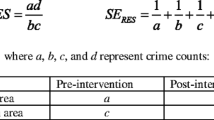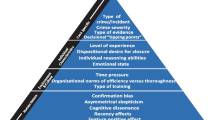Abstract
Few experimental attempts have been reported comparing the sentencing decisions of professional judges and that of laypeople using the same criminal case. This study examined the sentencing justifications (retribution, incapacitation, general deterrence, and rehabilitation) and the resulting imprisonment sentencing differences between Japanese judges and laypeople. The online quasi-experiment comprised 48 judges and 199 laypeople. Participants read a fictional murder case, and they were asked to respond on two types of justification scales and enter the number of years of imprisonment for the offender. Both the judges and laypeople placed the highest importance on retribution in the numerical input scale, which failed to detect the difference. The Likert scale revealed that judges add less weight to rehabilitation, incapacitation, or general deterrence, than laypeople. As predicted, the number of imprisonment years chosen by judges was significantly shorter than that of laypeople. The differences in justification can cause disagreements between judges and laypeople. This study suggests that judges do not give much consideration to justifications and decide on sentencing based on different criteria than laypeople. Differences from previous studies related to the judges’ emphasis on justification and the disparity of sentences are also discussed.



Similar content being viewed by others
Data availability
Questions, data, and experimental material (text on the case) are available in the Open Science Framework or as supplementary material.
Code availability
Not applicable.
Notes
The new Model Penal Code “purposes” section is significantly different. It now sets the primary distributive principle for criminal liability and punishment to desert that is, the blameworthiness of the offender. Alternative distributive principles such as deterrence, incapacitation, or rehabilitation may be pursued only to the extent that they remain within the bounds of desert (Robinson et al. 2010, p. 1944).
Standard Deviation.
Although two items each may not be enough, we decided to use the same items as in the previous study (Orth 2003).
References
Bentham J (1843) The works of Jeremy Bentham (Vol 1). William Tait, Edinburgh
Berryessa CM (2018) The effects of psychiatric and “biological” labels on lay sentencing and punishment decisions. J Exp Criminol 14:241–256. https://doi.org/10.1007/s11292-018-9322-x
Brubacher MR (2018) Third-party support for retribution, rehabilitation, and giving an offender a clean slate. Psychol Public Policy Law 24:503–517. https://doi.org/10.1037/law0000179
Carlsmith KM (2006) The roles of retribution and utility in determining punishment. J Exp Soc Psychol 42:437–451. https://doi.org/10.1016/j.jesp.2005.06.007
Carlsmith KM (2008) On justifying punishment: the discrepancy between words and actions. Soc Justice Res 21:119–137. https://doi.org/10.1007/s11211-008-0068-x
Carlsmith KM, Darley JM, Robinson PH (2002) Why do we punish? Deterrence and just deserts as motives for punishment. J Pers Soc Psychol 83:284–299. https://doi.org/10.1037/0022-3514.83.2.284
Corlett JA (2010) Punishment and ethics: new perspectives. Palgrave Macmillan, Basingstoke
Crow MS, Bales W (2006) Sentencing Guidelines and focal concerns: the effect of sentencing policy as a practical constraint on sentencing decisions. Am J Crim Justice 30:285–304. https://doi.org/10.1007/BF02885896
Crow MS, Gertz M (2008) Sentencing policy and disparity: guidelines and the influence of legal and democratic subcultures. J Crim Justice 36:362–371. https://doi.org/10.1016/j.jcrimjus.2008.06.004
Eisenberg T, Heise M (2011) Judge-jury difference in punitive damages awards: who listens to the Supreme Court? J Empir Leg Stud 8:325–357. https://doi.org/10.1111/j.1740-1461.2011.01211.x
Eisenberg T, Hannaford-Agor PL, Hans VP, Waters NL, Munsterman GT, Schwab SJ, Wells MT (2005) Judge-jury agreement in criminal cases: a partial replication of Kalven and Zeisel’s The American Jury. J Empir Leg Stud 2:171–207. https://doi.org/10.1111/j.1740-1461.2005.00035.x
Eisenberg T, Hannaford-Agor PL, Heise M, LaFountain N, Munsterman GT, Ostrom B, Wells MT (2006) Juries, judges, and punitive damages: empirical analyses using the Civil Justice Survey of State Courts 1992, 1996, and 2001 data. J Empir Leg Stud 3:263–295. https://doi.org/10.1111/j.1740-1461.2006.00070.x
Englich B, Mussweiler T, Strack F (2006) Playing dice with criminal sentences: the influence of irrelevant anchors on expert’s judicial decision-making. Pers Soc Psychol Bull 32:188–200. https://doi.org/10.1177/0146167205282152
Fukushima Y, Mukai T, Aizawa I, Iriama S (2021) Judges’ evaluation of psychological FINDINGS: EMPIRICAL research on criminal judgment. Jpn J Psychol 92:278–286. https://doi.org/10.4992/jjpsy.92.20212
Gottlieb A (2017) The effect of message frames on public attitudes toward criminal justice reform for nonviolent offenses. Crime Delinq 63:636–656. https://doi.org/10.1177/F0011128716687758
Graham J, Nosek BA, Haidt J, Iyer R, Koleva S, Ditto PH (2011) Mapping the moral domain. J Pers Soc Psychol 101:366–385. https://doi.org/10.1037/a0021847
Gromet DM, Darley JM (2009) Punishment and beyond: achieving justice through the satisfaction of multiple goals. Law Soc Rev 43:1–38. https://doi.org/10.1111/j.1540-5893.2009.00365.x
Guthrie C, Rachlinski JJ, Wistrich AJ (2007) Blinking on the bench: How judges decide cases. Cornell Law Rev 93:1
Harada K (2006) Hoteikei-no-henkou-to-ryoukeinituite. Changes in statutory penalties and sentencing. Keihouzasshi 46:32–42
Harada K (2008) The practice of sentencing, 3rd edn. Tachibana Syobo, Tokyo
Hastie R (2000) Emotions in juror’s decisions. Brooklyn Law Rev 66:991
Japan Federation of Bar Associations (2020) White Paper on Attorneys 2020. https://www.nichibenren.or.jp/library/en/about/data/WhitePaper2020.pdf. Accessed 19 Dec 2021
Kanai R (2012) Dotoku Kiban Shakudo [Moral Foundations Questionnaire]. https://docs.google.com/spreadsheets/d/1UflzHkc8g5ohW_MIKGzbrGH5bIPiJoWcSvfuq7OsoYc/edit#gid=39. Accessed 20 Feb 2021
Kant I (1952) The science of right. (Hastie W, Trans). In Hutchins R (ed) Great books of the Western world. T & T Clark (original work published 1790), pp 397–446
Keller LB, Oswald ME, Stucki I, Gollwitzer M (2010) A closer look at an eye for an eye: Layperson’s punishment decisions are primarily driven by retributive motives. Soc Justice Res 23:99–116. https://doi.org/10.1007/s11211-010-0113-4
Mastumoto T (2006) Keijisaibankan-ra-no-ryoukeikankaku-to-ryoukeikijyun-no-keisei [Criminal judges’ sense of sentencing and the formation of sentencing standards]. Keihouzasshi 46:1–17
McFatter RM (1978) Sentencing strategies and justice: effects of punishment philosophy on sentencing decisions. J Pers Soc Psychol 36:1490–1500. https://doi.org/10.1037/0022-3514.36.12.1490
Ministry of Justice (2018) White paper on crime 2018. https://hakusyo1.moj.go.jp/jp/65/nfm/mokuji.html. Accessed 19 Dec 2021
Orth U (2003) Punishment goals of crime victims. Law Hum Behav 27:173–186. https://doi.org/10.1023/a:1022547213760
Oswald ME, Hupfeld J, Klug SC, Gabriel U (2002) Lay-perspectives on criminal deviance, goals of punishment, and punitivity. Soc Justice Res 15:85–98. https://doi.org/10.1023/a:1019928721720
Rachlinski JJ, Wistrich AJ (2017) Judging the judiciary by the numbers: empirical research on judges. Annu Rev Law Soc Sci 13:203–229. https://doi.org/10.1146/annurev-lawsocsci-110615-085032
Ramseyer JM, Rasmusen EB (2001) Why is the Japanese conviction rate so high? J Leg Stud 30:53–88. https://doi.org/10.1086/468111
Robinson PH (1987) Hybrid principles for the distribution of criminal sanctions. Univ Pennsylvania Carey Law Sch 82:19. https://scholarship.law.upenn.edu/faculty_scholarship/621
Robinson PH, Goodwin GP, Reisig MD (2010) The disutility of injustice. N Y Univ Law Rev 85:1940–2033
Rucker DD, Polifroni M, Tetlock PE, Scott AL (2004) On the assignment of punishment: the impact of general-societal threat and the moderating role of severity. Pers Soc Psychol Bull 30:673–684. https://doi.org/10.1177/0146167203262849
Spiranovic CA, Roberts LD, Indermaur D, Warner K, Gelb K, Mackenzie G (2012) Public preferences for sentencing purposes: what difference does offender age, criminal history, and offence type make? Criminol Crim Justice 12:289–306. https://doi.org/10.1177/1748895811431847
Spohn C (2009) How do judges decide? The search for fairness and justice in punishment. SAGE, London. https://doi.org/10.4135/9781452275048.n3
Sporer SL, Goodman-Delahunty J (2009) Disparities in sentencing decisions. In: Oswald ME, Bieneck S, Hupfeld-Heinemann J (eds) Social psychology of punishment of crime. Wiley, New York, pp 379–401
Statistics Bureau of Japan (2020) Population Census. https://www.stat.go.jp/english/data/kokusei/2020/summary.html. Accessed 19 Dec 2021
Steffensmeier D, Demuth S (2001) Ethnicity and judges’ sentencing decisions: Hispanic–Black–White comparisons. Criminology 39:145–176. https://doi.org/10.1111/j.1745-9125.2001.tb00919.x
Training and Research Institute for Court Officials (2007) A study on public and judge’s attitudes toward sentencing—a case of murder. Training and Research Institute for Court Officials, Hosokai
Twardawski M, Tang KT, Hilbig BE (2020) Is it all about retribution? The flexibility of punishment goals. Soc Justice Res 33:195–218. https://doi.org/10.1007/s11211-020-00352-x
Tyler TR, Boeckmann RJ (1997) Three strikes and you are out, but why? The psychology of public support for punishing rule breakers. Law Soc Rev 31:237–265. https://doi.org/10.2307/3053926
Vardsveen TC, Wiener RL (2021) Public support for sentencing reform: a policy-capturing experiment. J Exp Psychol Appl 27:430–446. https://doi.org/10.1037/xap0000339
Vidmar N, Miller DT (1980) Social psychological processes underlying attitudes toward legal punishment. Law Soc Rev 14:565–602. https://doi.org/10.2307/3053193
Warner K, Davis J, Spiranovic C, Cockburn H, Freiberg A (2019) Why sentence? Comparing the views of jurors, judges, and the legislature on the purposes of sentencing in Victoria, Australia. Criminol Crim Justice 19:26–44. https://doi.org/10.1177/1748895817738557
Watamura E, Wakebe T, Maeda T (2011) Can jurors free themselves from retributive objectives? Psychol Stud 56:232–240. https://doi.org/10.1007/s12646-011-0079-9
Watamura E, Wakebe T, Saeki M (2014) Experimental verification of the anchoring effect of a punishment reference histogram. Jpn J Soc Psychol 30:11–20. https://doi.org/10.14966/jssp.30.1_11
Weiner B, Graham S, Reyna C (1997) An attributional examination of retributive versus utilitarian philosophies of punishment. Soc Justice Res 10:431–452. https://doi.org/10.1007/bf02683293
Acknowledgements
We are grateful to Mr. Ryu Ishii, chief public prosecutor, for his helpful discussions and suggestions on the manuscript.
Funding
This research was facilitated by grants from JSPS KAKENHI (Grant Number 19K14358).
Author information
Authors and Affiliations
Contributions
WE led the study and conducted the experiments. WT reviewed the research plan and participated in writing the paper. IT analyzed the data.
Corresponding author
Ethics declarations
Conflict of interest
The authors have no conflicts of interest to declare relevant to the content of this article.
Ethical approval
The questionnaire and methodology for this study were approved by the Ethical Review Committee for Behavioral Sciences, Graduate School of Human Sciences, Osaka University (Ethics approval number: HB020-023).
Consent to participate
Informed consent was obtained from all individual participants included in the study.
Consent for publication
The participants consented to the submission of this report to the journal.
Supplementary Information
Below is the link to the electronic supplementary material.
Rights and permissions
About this article
Cite this article
Watamura, E., Wakebe, T. & Ioku, T. A comparison of sentencing decisions and their justification between professional judges and laypeople in Japan. SN Soc Sci 2, 48 (2022). https://doi.org/10.1007/s43545-022-00353-4
Received:
Accepted:
Published:
DOI: https://doi.org/10.1007/s43545-022-00353-4




